By Claire Bacon, ACN, CNC
Today’s health blog follows a different format. Recently, I had the distinct pleasure to interview Dr. Len Mather, one week following his 90th birthday. To sum up my impression of Dr. Mather, I would have to say he is the epitome of how we all want to be as we advance in age: sharp as a tack, witty, full of funny stories, and as independent as can be. He is very well-spoken, always careful with his words, choosing only the words that state exactly the facts and his feelings at the time. He remembers every detail and the emotions tied to every experience.
Dr. Mather is as youthful and spry as 90 can be. He has a spring in his step and a light in his eyes that hints of mischief. We have met twice at our local Weston A. Price meetings, where the discussions always surround an aspect of healthy living. Seeing his strength and energy, I knew I had to find out what were the secrets to his success of staying healthy and living his best life.
I was immensely blessed to have this experience and hope I can do his story justice. By describing the details to you, my hope is that you gain inspiration for your own healthy life. Through understanding the daily habits that have led to such longevity, each of you can model your choices after his fine example.
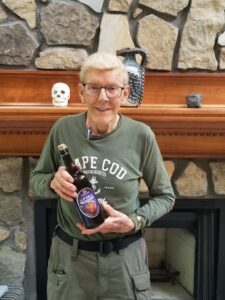
Let’s start at the beginning…
Tell me about your childhood and what first influenced your family’s health?
As a child, my parents followed Jack Lalanne. My parents first met him on the Atlantic City Boardwalk. Jack Lalanne took a room at the Marlboro-Blenheim hotel, which was a historic hotel property built around 1905. My mother (Sophie) was a nanny to the Blenheim family who owned the hotel. Sophie and Mrs. Blenheim became good friends. Mrs. Blenheim had a deep respect for my Mom. She liked her “chutzpah” – her audacity and inner strength, as she stood up to Mr. Blenheim – he was always antagonizing the two women. He tended to be curt and rude, ordering the women around.
While preparing breakfast one morning, he barked, “Sophie! I want my eggs separated!” She took the two eggs and placed them in front of Mr. Blenheim, and smashed each one. “There! They’re separated!” And she walked away. He said, “You’re fired!” And Mrs. Blenheim replied back, “Honey, if Sophie leaves, I’m going with her!” And she meant it. Which of course, Mr. Blenheim was taken aback, and said, “Alright, then stay. But I don’t want you preparing my food anymore. You’re a s***show!”
Our family became healthy as a result of knowing the Blenheims and also getting to know Jack Lalanne in the hotel. This was when I was around 12 – about 1944. And all the changes in our family’s diet started happening at this time. And my parents would use fitness bands strapped to the door handles or used in various ways to stay in shape. Both my parents got into the fitness trend. They continued eating meat, fruits and vegetables, but stayed away from the industrialized food that had begun appearing in the grocery stores.

A side note about Jack Lalanne: If you don’t know who he is or about his accomplishments, you need to! Just maybe there is a Stay Fit Seniors program in your area. One fabulous quote from the famed fitness buff (and did you know he’s a chiropractor, too):
“Dying is easy. Living is a pain in the butt. It’s like an athletic event. You’ve got to train for it. You’ve got to eat right. You’ve got to exercise. Your health account, your bank account, they’re the same thing. The more you put in, the more you can take out. Exercise is king and nutrition is queen: together, you have a kingdom.”
Jack Lalanne
1940’s Food
Around this time the medical field made a big mistake – they gave in to the huge sugar lobby which hired people to do biased research and concentrate on finding significant differences in dietary trends that led to heart attacks. They documented connections with heart attacks and fats. But that’s not what caused it. Sugar caused it, but they didn’t want people to know that. So, they blamed it on fat. That was the era when you had margarine considered good by the medical profession. Only later on when they got the right research did they change that.
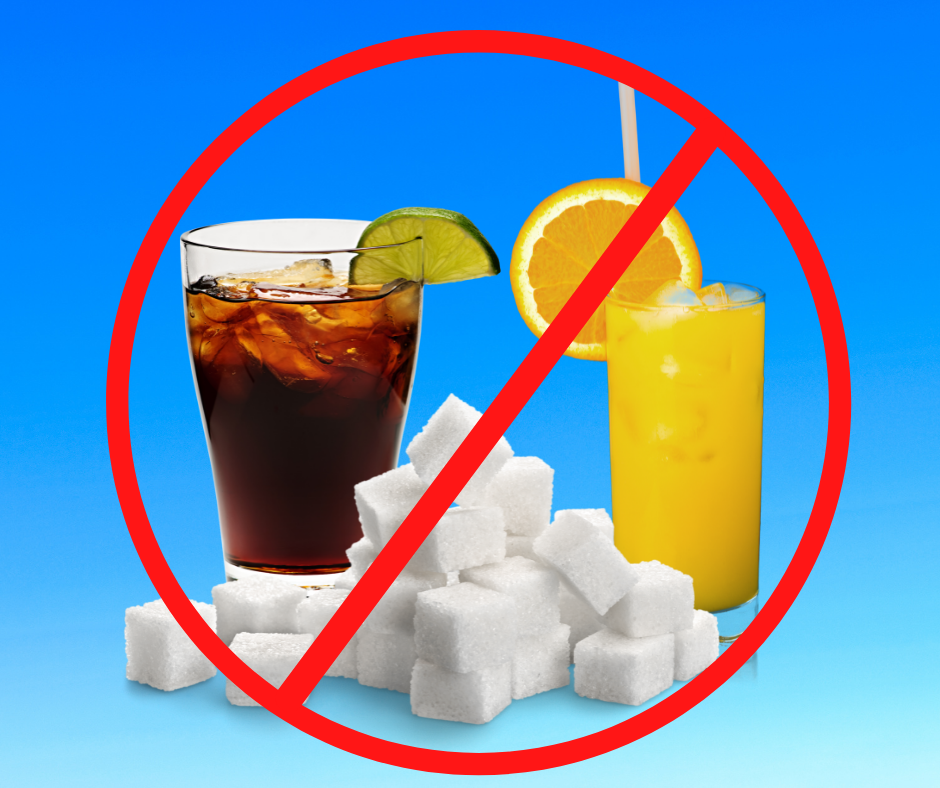
Avoiding Processed Foods
When I was a kid, we didn’t ever buy Wonder Bread. Our dietary influence came from my mother’s heritage of being Polish. They always preferred rye bread with carraway seeds.
Soda pop was not allowed in the house. My friends would mention it, and Mom would tell them outright, “If you want that type of soda you can go get it, but we don’t have it in the house. And I still don’t buy sugar. You may know this: cancer cannot survive without sugar. It NEEDS sugar. So, people who are skillful at not having the cancer develop will mention to look at your A1c. Now the marketers are putting out drugs to lower your A1c. The A1c shouldn’t be any higher than 5.6. They give you this phony drug, they give you the limits of what it can do – to keep it below 7.6. Well, 7.6 is a disaster to begin with. If you go look to the marketing you might [be convinced and] get the drug that lowers your A1c. But you could do much better getting your diet and absorption right. That’s the trick that’s happening now.
Did you always have an eye out for medication, Wanting to stay away from it?
Yes. I was avoiding medication at all costs, because the medication was viewed to be a source of illness – that they actually make you sick.
I experienced this in person when I had my Masters degree. At the time (1956-1957) I was working in the State mental hospital. When the drug salesmen would come to the hospital, they can’t tell by looking at you if you’re an MD or not. So there I was with the MDs, and the salesmen would give me samples. I didn’t bother to tell them I’m not an MD, I just took the samples.
Sadly, my daughter got her hands on them when she was 3. It was Tetracycline. A side effect of too much Tetracycline is you get hypoplasia of the bones and teeth, and her teeth turned gray. Her baby teeth and then her permanent teeth came in as gray. And stayed gray for a number of years. She went to the dentist – he couldn’t do anything. Eventually, she managed to somehow, I don’t know how it worked out in her system, but her teeth now are not gray. Every cell in the body rejuvenates – that must have been what it was.
Have you always had strong teeth your whole life?
Yes, all my life. And the great feature was, they were impervious to cold. So when I was young – no older than 16 – one of the kids had a double dip of ice cream, and asked me, “You wanna have some?” And so I bit the entire top scoop of ice cream. He was upset. Oh no!! (imitating crying) And I was chewing on it, and it finally melted and went soft. And later I was telling that to my Mom, and she said “Leonard, that’s a terrible thing you did. Here’s a quarter (that’s what a double dip cost then). Go back to this boy, give it to him and tell him he can have this and you’re sorry you’ll never do it again.
So I found him, gave him the quarter, and he was happy as hell. And everything was ok. And I learned my lesson not to do that. It was kind of mean, in a way, because I could do something he couldn’t do – he had to lick it. Even now, when I go to the dentist every 6 months to get cleaned, they put a jet spray to clean [my teeth] and it’s cold and I can take that. They commented on that, “You can handle this cold very well.”
Don’t you love knowing about Weston A Price and his studies on indigenous populations?
Yes, his research is very instructive. And dental issues are a great prognostic of trouble we have as a result of diet. Especially sugar is the most detrimental thing to bones and teeth.
Harmful Effects of Sugar
I used to know a man who drank 12 bottles of soda pop a day. Because that’s what he wanted. He wanted soda pop, his wife bought the soda pop, he got the soda pop. When they had a son, the poor boy grew up with soda pop. So, the father eventually had peripheral neuropathy, he lost his leg, it got cut off at the knee, and later died. And the son now, he’s alive and grown up. And he now has broken some of the toes of both feet. He also wears a boot because these toes that were broken are now in a state of healing. And he has been given soda pop by his mother available for every time he visits.
One time, I talked to him to find out if he might change. And he said “Oh no, the main thing is your taste. If it tastes right, that’s why you eat it.” I said, “I guess the main taste, if you had to name the taste, it would be sweet, right?” He said “Yes!” So, he’s stuck.
CB: That’s too bad. His whole life, his whole foundation is based on sugar. And so he’s going to have weak bones, weak teeth, weak immune system, weak gut his whole life. He’ll never be healthy.
Dr. Len: Yes, and I don’t dare mention it because he grew up on it. And so the fact that his father died with a foot problem – the neuropathy – it’s coming to his son. And I just feel sorry for the whole situation.
Tell me about your work and timeline of where you’ve lived?
- 1932 I was born in Wilkes-Barre, Pennsylvania.
- Early 1940’s, we moved to Atlantic City, New Jersey.
- 1950 I graduated high school. I started working around this time assisting my Dad with electrician work.
- 1950-1954 obtained Bachelor’s degree from Penn State, then joined the Army.
- 1966-1967 obtained a Masters in Clinical Psychology at Richmond Professional Institute of William & Mary (RPI later changed its name to VCU Virginia Commonwealth University in 1968). Lived near Falls Church, VA. I married during this time and we had a daughter. GI Bill funded my education.
- 1968-1970 Obtained a PhD in Special Learning Disabilities at Catholic University of America in Washington, D.C.
- 1969-1970 I worked at Howard University in Washington, D.C. (story below)
- 1971 Started working for the largest community college in the US – Virginia Community College System – as a Professor. Focused on General Psychology and Psychological Foundations of Criminal Behavior.
- 1971 Bought my first home and rental properties (story below)
- 2006 Retired
- 2010 Moved to Atlanta
Post-Graduate Years
While enrolled at RPI for my Masters degree, my advisor got a frantic call from Howard University – Dr. Cheek – who at 36 was the youngest university president in the United States. He called my advisor, frantic, to say that a Dr. Dotti who was in charge of research for Masters and PhD students had died at his desk. “What can you do to help us out?” It was the middle of the semester. So, my advisor put his hand on the phone and he said “Len, you want a job at Howard U?” And I’m on the GI Bill, just making (squat). And I said “YES.”
He sent me over to Howard U. I talked with Dr. Cheek. All the students that were in their Masters and PhD degree programs (same as me at the time) need direction. Can you fill in until you can be replaced? That’s how long you’ll be here. I wanted the job, I took it. Not through any brilliance, but because of the death of Dr. Dotti.
Teaching and Learning…
So, while I’m at Howard U teaching, I knocked myself out teaching those people in Masters and PhD programs with that stuff I was being taught at the same time. I was learning it and teaching it at the same time. And the report goes back to Dr. Cheek – I’m doing the best the job that they ever had encountered! Better than Dr. Dotti!
Dr. Cheek visits me at my desk – where I was “Mr.” Mather. And he says, “When you get your PhD concurred, please let me know so I can put down “Dr.” Mather on your desk – you have a job. You’ll be an Assistant Professor. And that was what happened! As a result, I got my PhD, and then through my Dad’s advice, don’t go to a college where it’s “publish or perish.” So I went to Virginia Community College system, where you have 5 year blocks of time. And had 3 appointments. I was at Howard for 1969, 1970. And in 1971 I went to Virginia Community College System, while living in the poorest section of Mt. Pleasant, D.C – not far from Falls Church, VA. And in 1971 after I got the PhD, that’s when I bought the house of the poor person who let me have it.

Becoming a Landlord
You see, my Dad always said, if you work for a community college you don’t have to spend [all your] time publishing papers and books. You have time to do other things, make money in other ways. I worked as my Dad’s assistant as an electrician while doing my PhD. At the time, in Washington DC, the real estate market was really hot – no one could afford to buy the overpriced homes. On my Dad’s advice, I used my free time to become a landlord using my electrician skills. The way it worked was, I found a home in a poor neighborhood. I met the neighbors, and offered to buy their houses and rent back to them at a fair price they could afford – in exchange for doing all the upkeep without charging them anything extra. By the way, I was the only white man in the neighborhood. I bought three townhomes side-by-side, which was very smart because it set me up to make future money off the real estate market. Overall, I felt like I was a good neighbor and it was good for the community.
On Grilling vs. Deep Frying…
I noticed the neighbors cooked differently than I did. Whereas I was eating more fresh foods and grilling meat and vegetables, the neighbors were deep frying in vegetable oils. This observation turned into a good investment strategy. I started investing in Dialysis companies. Because the average person who eats lots of oil and fried things – they become obese and tend to develop complications and kidney failure, and also urinary tract infections. So I saw that my tenants all showed these health problems and I saw the [future] demand for dialysis treatment. The typical medical treatment using antibiotics for the UTIs just creates new problems – it kills off all the gut bacteria (bad as well as good) and disrupts the microbiome. Yeast organisms can proliferate in the absence of the good bacteria to hold it in check. So with widespread yeast and malabsorption, then lack of energy and further infection can follow.
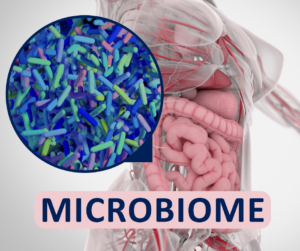
Did your parents have good longevity?
My Dad did. My Mom did not believe in doctors at all. Unfortunately, because she was of Polish background, Polish people blame every pain you have on GAS. My Mom believed everything she had was gas. And so she’d go to get some antacid. But what she had was a cancerous growth in her bladder, eventually causing a bladder prolapse. And when she had urine coming out of her vagina, she went to the doctor, who said it was too late. Mom died when she was 72.
My Dad had great faith. He would pray in every church in town. In fact he was praying somewhere in some church the day I was born. They had trouble finding him – as my Mom’s doctor needed his signature to approve the C section! And Dad died at the age of 83. He had the Black Lung (coal worker’s pneumoconiosis). Because when he was 12 he was a breaker boy. They didn’t have machines to separate the coal, so they’d send these boys (age 11, 12) to get in to separate the coal. Without a machine, he had to breathe the coal dust and he’d get payment for that. But it enlarged his heart because his heart had to work too hard, and as a result his heart was larger than it should be. And it became flaccid.
Your parents gave you such a good example. Did you also have chickens, pigs, goats?
Yes, that was from my grandmother. She’s the one who came from Poland and gave birth to my mom – not on the boat, but just after it landed at Ellis Island. So my Mom became a citizen just like that.
My grandma had to do it the hard way. Those were the visits to Grandma’s house – in her yard she had chickens, ducks, a goat, a pig, turkeys, she had a grapevine – we made wine. And all the food came from Grandma’s backyard. We didn’t buy much. At our house, we had a vegetable garden, and we had a grapevine as part of the grapevine from Grandma.

Psychology and Family Tension
At my grandma’s place, my grandfather couldn’t speak English, so he got a job in the mines. In order to get the most money, he became a contract miner, and didn’t have to follow the Union laws. As a result, when dynamite blew the coal to come down, the regular miners in the Union could not go in there, until it settled. The contract miners could go in there, made more money. But he also paid the price of getting Black Lung, at the age of 44.
And so Grandma unfortunately (after I got my degree) I found out my Grandma was a narcissistic personality disorder. That’s why when I was little, I could see, every time Mom took me to see Grandma, there was a big blow up fight all in Polish, I couldn’t understand it yet. And my Mom was in tears every time. So even at the age of 6, I told her “I don’t want to go to Grandma’s anymore.” Because I saw it upset my Mom. My Dad was on my side. So he said we’re not going to Grandma’s anymore and I supported that.
Narcissism…
CB: What do you think they were arguing about?
Dr. Len: When you’re a narcissistic personality disorder, it’s your way or the highway. And they argued mostly about the fact that when Grandfather at age 44 couldn’t work, Grandma told him to leave, “Get out!” She got pregnant with my mom when Grandma was 19. So, Mom with me at a tender age, the argument was about Grandfather. He had to go to the Polish national church, to a farm where they accepted people like him. I think he worked on that farm until I was at 5. And at 5 we moved to a certain house, and Grandfather moved in with us until he did die – because he had Black Lung. The funeral was at this house when I was 5, not yet 6, and that put an end to that battle.
I have pictures of him at the farm where he was taken, if you’d like to see it… He had money and wanted to build a house. (showing me the picture) And this is the front of it, this is the back of it. They rented one side out and lived in the other side. And Grandfather here – when Grandmother threw him out, he’s at the farm, they’re taking care of him, and I’m just a toddler. And this is my Uncle Joe in a baseball uniform. He became an amateur boxer.
Uncle Joe
Uncle Joe he invented a multi-mixer – when there weren’t any multi-mixers, there was only a single mixer. If you go to a place where ice cream sodas were made, you waited in line until that mixer would be next in line. So he invented a multi-mixer – this was early on in the late 30’s or early 40’s. And Hamilton Beach conveniently got a hold of him, promised him $65,000 a year for LIFE if he let them have the patent. He agreed because back then $65,000 made you “up there”. But (laughing) he went to New York and in New York trying to be an amateur boxer, that $65k didn’t last long.
On Bullying…
Since he was a boxer, he told me he was going to train me on boxing skills and technique in case older kids in the class wanted to try something. He said to make sure you hit ‘em in the nose and mouth so they can taste the blood and that’s when you go in for the solar plexus. And it really worked because nobody bothered me. And he gave good advice – he said, “Also, don’t do it on school grounds. Make sure you’re on City property.” And that worked like a charm. I boxed only with Uncle Joe and he said, “Don’t advertise it, don’t teach it to anybody. Wait until you use it.” (laughing) It was ok. And the word would spread. And they left me alone.
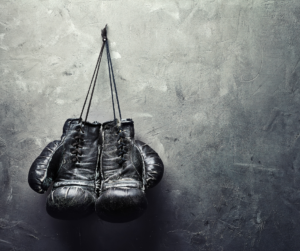
Growing up, what kinds of sports did you do?
I was on the wrestling team and on the track team, and the reason I chose that instead of football and baseball was that I played the accordion and I needed to have dexterity unimpaired by hitting a ball, so that’s why I went that route.
And in my adult years, that was sandlot football. From what I remember, like it happened yesterday, it was the older boys always who were like quarterbacks and all – and I remember them shouting out (because I was always the end, I’d run in, get the pass) who would say “watch him – he’s fast!” (laughing) The common thing – no one could beat me running. And including still today, there’s no one else my age group – they’re all on walkers!
When I go to Kaiser Permanente, they have little things for our age group – I call ‘em the old farts and I shouldn’t – they call it the 50 yard dash – it’s just a joke. And so naturally I beat them, and then one time I turned around. I said, “Come on, you can do better than that!” (laughing)
what kinds of activities do you Do to stay healthy?
I’m on over an acre of land. Half of it goes that way down to the creek, the other half goes up to the road. I take care of it, that’s what I do. There’s this dead tree in my backyard. When it falls, those branches you see will break off and at that point I will bundle them up and burn them, during the time that’s allowed to burn. There are rules you have to follow. And I can do that.
Trapping and Relocating…
I have a trap out front for moles and voles. A chipmunk rarely gets in it, squirrels sometimes do. I just let them out, but not here on the property. I take it in my car and go several miles away, and let them out there. (laughing) I just move them. Because we have too many squirrels, and I don’t mind doing that.

Are you an animal lover? Do you have pets?
No, I consider them to be a pain in the a**. If I did have a pet, I know it would be an aggravation for me. I don’t want to mess with that. I wouldn’t allow them in bed. That’s a known disruptor of your sleep pattern. I found that out by going to Kaiser Permanente and talking about sleep – disrupted sleep will cause cortisol buildup inside. And one of the doctors there was first a veterinarian and decided instead to go to medical school. And what we found out from the veterinarian research was that glyphosate poisoning (that’s Roundup) can adversely affect a person who can get swollen glands and problems from the glyphosate. They’re mostly women, not men. And the reason is this: more women will cuddle with the dog [in bed]. The dog can’t read and runs through the grass where [the sign] says “stay off the grass”. It gets into the dog’s paws, he licks the paws, then gets into bed with whomever – and it’s the women most often. It’s that type of condition of – it’s really an infection of your glands that the person gets from the dog, in addition to disrupted sleep.
Avoiding Glyphosate…
CB: And you probably have a good eye out for trying to eat organic foods, so you don’t get glyphosate on your vegetables?
Dr. Len: I get organic only. My first stop is Trader Joe’s for whatever organic they have, if they don’t, then I’m going to Sprouts. And the last place would be – if you feel like you’re very wealthy, you could go to Whole Foods and get ripped off there. (laughing)
If you want to do some research on apples, apples are rated primarily on their sugar content. The apples that have the most sugar, naturally most people will want the taste of them. So apples are not on my list at all. They’re too much sugar. That’s why I don’t want to get it. Instead, I’ll get Kiwi, papaya, navel oranges, green bananas (unripe).

Do you eat breakfast?
Oh yeah, every day, I’ll eat breakfast around – no later than 9. And then lunch is around 1, and dinner is before sundown. I will go to eat late when I’m invited out with some friends. I have a 90% rule. When I’m in the house, I’m 90% doing what I’m supposed to do. When I eat out with friends at night (late), I’m in the 10%. Because you don’t know what that cook is doing in the kitchen. And sometimes they actually use canola oil. Because at Trader Joe’s, they’re now SELLING canola oil for people who don’t know any better. When I’m on the outside, and I don’t know what the h*** the chef is doing, I’m at my 10% rule.
And then we took a step into the kitchen…
What cooking oils do you use here at home?
Trader Joe’s – the organic version of coconut oil, and then I’ll have extra virgin California Estates olive oil – it’s cold pressed. The ones from Italy are doctored up with industrial oil. The scary thing is that once they get their hands in it, you don’t know if you’re getting the real thing. So this is the one I use. And this – Trader Joe’s avocado oil. I’m hoping that this isn’t from – I’ll find out – (laughing) It’s a product of Mexico so I won’t know.
This is a good one – the MCT oil. It goes into when I do this (reaching for a bag of frozen seafood). I’ll take a portion of this – no sodium, no preservatives, and I’ll cook it with vegetables that I put in. Grated zucchini and this will be put in whatever I’m going to make – maybe a soup.
What’s in Your Fridge?
Or maybe I’ll put it with this (and pulls out a frozen calf liver). This will be, once it’s thawed, it will be smothered with onions, MCT and olive oil.
And this was a gift – La Fin du Monde. This is an ale that is spiced, 9% alcohol. I’ll have this with friends when we go out. (See photo above).
The eggs are from Trader Joe’s. I will not eat chicken or eggs that are NOT pasture raised. If it says free range, it’s a LIE. It is very misleading to the public to think “free range” is ok. Free range means that chicken was in confined conditions and then was allowed briefly to go 6’ out here to do whatever. And that’s different from a pasture.

You’ve got a lot of supplements here in your kitchen cabinet
CB: You’ve done a lot of reading about these?
Dr. Len: Yes, and in addition I spent a lot of years learning about age management. So that was part of the instruction from medical doctors who were into getting you healthy without medicine. It was Cenegenics. In 2010 (that was the first year I moved here) in it they’re talking about protein, fats, carbohydrates, natural foods, beverages, and supplementation. That was a training program that I mastered from the MDs who wanted you HEALTHY rather than prescriptions to get you sick. So, all that is the result of the 2010 program that I’m still applying now. Things like resveratrol, N-acetyl cysteine, magnesium, quercetin, lutein, astaxanthin, pine bark, Co Q10, liver support… The program was personalized for me.
Then we went back to the den…
Dr. Len, you take the stairs up and down so quickly!
This is why I don’t want to move from this house, this is the habit I developed in college. And I still use it. When I was at Northern Virginia Community College, the building was 4 stories high. I chose my classes (that I taught) to be on the fourth floor. And when I parked and came, I went up the steps, never the elevator, taking the steps two at a time. I would give these certain “assignments” to my students so I wouldn’t get in trouble. And the assignment was, “this is extra credit. It’s optional, you don’t have to do it. But your credit comes from a report you’re making to the class. And it has to be recorded. So, you know what you said and the recording is yours, it’s not mine.
The credit is take the elevator up to my class and make notes as to the size of the other people – are they “at weight” or “overweight”? Your opinion. And ah, that’s the report, you’ll give it to the class. It’ll be recorded. Well, you know what they said, fat people were on the elevator. Not people “at weight.” And one woman TRIED to complain and failed miserably because I DIDN’T SAY IT – the student gave the report. It was not REQUIRED, it was optional. And recorded. And when the Dean called me in to discuss it, I said, “how are you going to handle this?” He said, “you’re doing a good job, just forget about it.” (laughing)
Making Lunch Healthy…
All my life, I never ate at the cafeteria at that college. I always brought my lunch. I told the students, during my section on Nutrition, that if you want to violate all the regulations, go to the cafeteria. It’ll increase your weight, you’ll get bad reports, that’s up to you.
My lunch – it was always vegetables, not meat. And when it was meat, it was either sardines in olive oil or oysters packed in olive oil also, on crackers.

Did you ever go through a trend where you didn’t eat meat?
No, it was always… I couldn’t take meat to the college because it was too cumbersome. We had a refrigerator but I was afraid that someone might take it. Because that’s one of the things that would happen at the division – people would take other people’s stuff. I don’t know why. No, the other things in addition to the canned stuff that I told you, I would take soft boiled eggs in the shell. I can boil them so they’re not super hard.
On Not Eating Too Late…
Once in a while, someone would try to invite me out for lunch but I wouldn’t go, because I said I have lunch. I’m not going. For an evening class, sometimes they would invite me out but I said “I don’t eat after a particular time.”
And [even now] I don’t drink anything after 6:00 because I don’t want to get up at night and disrupt my sleep. Because I CAN sleep through the night without getting up to pee, and there’s a reason for that: because I don’t overload myself with too many liquids after sundown. Even when the time changes and sundown is later, it’s always 6:00.
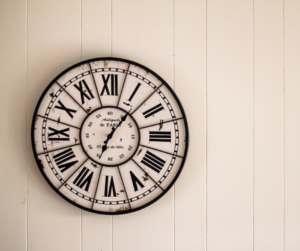
Tell me about your military service
I was in the military after finishing college in 1954. I got into the Army and they put me in Psychological Warfare (PSYOPS). And that resulted in a Temporary Duty Assignment (TDY) to the Marines. And the Marines did not want to get a manual that explained what PSYOPS did. They didn’t want to read it, didn’t want to have other people read it. They wanted to see somebody in PSYOPS to be asking questions directly. That’s what they wanted. That’s how I got there.
And the first thing they did was, these officers said “What is it exactly that you guys do?” I said our job is to use loudspeaker messages as well as pamphlet dropping. And our job is to demoralize the enemy so you can shoot their a**. So they won’t fight as well, because they won’t have that fire in them. They liked that. The officer actually said, “Well that beats reading a manual.” And that way, we’re on the same page. So that worked out nicely. And I was able to get back to my company.
CB: Did you have to fight overseas?
Dr. Len: Oh no, I had a desk job. I was sent to Germany, in Stuttgart. Our company was housed in Field Marshall Erwin Rommel’s house. And it was called a Panzer German warfare tank Kaserne. His house was there, and our company moved in it, and we were in a training session but didn’t have to go anywhere to fight. We were just instructing people how to go about it.
On Being an Intelligence-Analyst-Linguist…
We had a whole lot of people who came from other countries and were part of it because in order to get your MOS (Military Occupational Specialties – it was a 1920 MOS) you had to be called an Intelligence-Analyst-Linguist. And the linguist part was, in addition to English, you had to speak two other languages. Or understand to speak two other languages. And I got in there because of my Polish background, that I understood eventually Polish. And in college I did learn French, and I also learned Spanish.
CB: Which language was the most helpful to you?
Dr. Len: That would be French. I spent some time in France, and I liked it. I went through Europe on a motorcycle. It didn’t cost much because I stopped at people’s farms and barns and asked them, “may I sleep in your barn tonight?” And they were always so curious – the farmers ALWAYS invited us in for breakfast to chat. So, I learned really fast to have all kinds of goodie things that could be given to the women. Chocolates, garments… I was traveling with a buddy from the 5th Loudspeaker and Leaflet Company (5th L&L). He was from Czechoslovakia.

On PSYOPS…
CB: What kinds of things would the leaflets say?
Dr. Len: They were usually demoralizing things from finding out about what the enemy did. Like, if we found out that one of the enemies had a name we’d check into that. And if he had a girlfriend or wife, we’d check into that. The leaflet might say, “And what is Lisa doing tonight while you’re up here away from home?” That would make a guy think. And it might demoralize him. Now that’s a nice thing to have happen in PSYOPS, to make him be suspicious about what his wife is doing. “Do you suppose that maybe she’s doing the same thing you’re doing, that you’re not supposed to be doing?” And that was when we talked to these officers, they understood that by doing that, it bumfuzzles the enemy, which is beneficial and a good thing. (laughing) Well, hell is war, and war is hell.
Perspectives
CB: Have you felt over the last two years were some psychological effects done to the American public?
Dr. Len: Oh yeah, because they absolutely believed every word as true, especially if they were into and subject to responding to fear. And if they do that, then they’re going to listen to the media that gives you the propaganda. So, whenever I write about that, I don’t talk about the pandemic. I talk about the Planned-demic for the people who are subject to that type of anxiety and woe, to stay away from other people, wear a mask, self-isolate yourself, drink more whisky so you can get depressed and diabetic and get all kinds of issues.
CB: Wasn’t it so surprising that those were the same types of techniques you used on foreign enemies?
Dr. Len: Yes, very sad.
Dr. Len, thank you very much for your time and telling me all about your life. I have loved every minute of hearing your stories and perspectives!
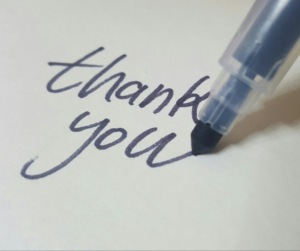
Looking Ahead
Looking ahead, we plan to do more interviews with friends and family in the Greatest Generation. So far, we have a lovely interview with Dr. Bob’s Grandma Jean, and also with our friend for many years, Martha Bobo. These stories and lessons learned are absolutely priceless. The things we learn from our prior generations enrich our history and ground us in our roots. We simply can’t replace the experience of learning what it was like “back in the good ole days.” And for those who don’t study their history…
“Those who cannot remember the past are condemned to repeat it.”
George Santayana (1863-1952), Reason in Common Sense, The Life of Reason, Vol.1


